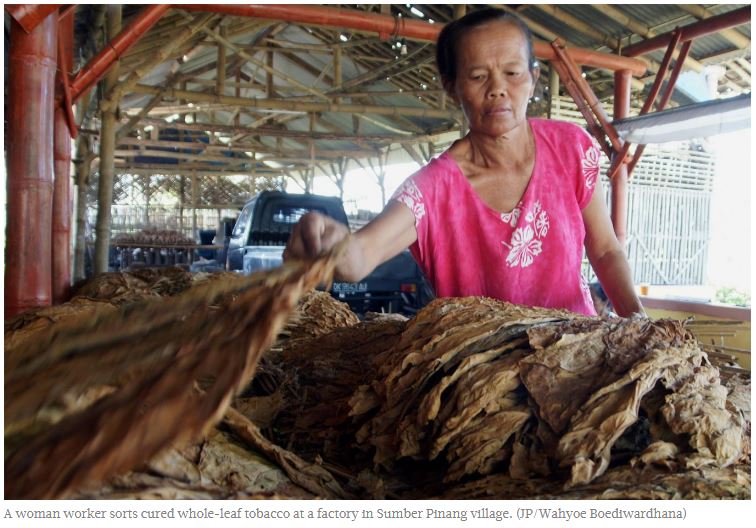As the rest of the world quits, Indonesia wants lax rules for tobacco investment
The government has insisted that its plan to liberalize the tobacco industry will trickle down positively in terms of job creation and export outputs despite the product being largely consumed inside the country, prompting criticism from tobacco control activists.
Aside from creating jobs and boosting exports, the proposed plan, which is part of a government effort to revise the negative investment list (DNI), would be put in place to reinvigorate small and medium business players, a ministry official said.
By opening up the industry to foreign investment, small-scale producers, who had been hurt by high excise rates, would have a new capital injection to improve their businesses and hire more workers, said Abdul Rochim, the Industry Ministry’s director of beverages, tobacco and refreshments.
Small and medium businesses in the tobacco industry shrank from 2,540 in 2011 to 487 last year, according to government data, as tobacco excise rates were gradually increased.
Exports of tobacco and its derivative products were recorded at US$906.2 million during January to September this year, according to Trade Ministry data, up by 7.11 percent from $846 million over the same period last year.
Abdul said the Industry Ministry had also proposed that new investments from big cigarette producers should be made in the bonded logistics zone to boost exports.
Clove and white cigarettes, along with cigars and other tobacco products, are among 49 business sectors that are to be opened up to foreign investment in the upcoming DNI relaxation.
The proposal comes from the Industry Ministry, which hopes that new investments in the tobacco industry, both foreign or domestic, will free big companies from the requirement to partner with small and medium businesses. Abdul said this requirement discouraged new investments in the industry.
However, the Indonesian Tobacco Society Alliance, an industry group whose membership ranged from tobacco farmer associations to cigarette producers, declined to comment as the DNI relaxation for the industry was still in the proposal stages.
Tobacco farmers, meanwhile, lauded the government’s move as it would trigger competition among producers that would, eventually, allow farmers to sell their product to the highest bidders.
“If they [foreign investors] come and compete to buy tobacco from farmers, I think it will benefit the farmers,” said Soeseno, the chairman of Indonesian Tobacco Growers Association.
He, however, added that local tobacco farmers might struggle to cope with the increasing demand as the government’s attention to the upstream sector in the tobacco industry remained limited.
Soeseno said most farmers lacked access to adequate capital and their crop yields could not compete with neighboring countries, such as Vietnam, where farms have higher productivity rates.
Tobacco control activists criticized the government’s move as it could be seen as supporting an industry many saw as being harmful to people.
Prijo Sidipratomo, the chairman of the National Commission on Tobacco Control, said liberalizing the cigarette industry was equal to handing over the overall domestic market to the tobacco industry.
Prijo added that the move was contradictory to the government’s National Medium-Term Development Plan 2015-2019, whose goal was to reduce smoking among people below the age of 18 from 7.2 percent in 2013 to 5.4 percent next year.
A study released in September by the National Planning Development Board projected that without strict control, the prevalence of Indonesian smokers aged under 18 would grow to 10.7 percent by next year, 15 percent by 2024 and 16 percent by 2030.
Indonesia is the only ASEAN member country that has yet to sign the Framework Convention on Tobacco Control, a global framework from the World Health Organization that mandates strict rules regarding tobacco production, advertising and taxation that aim to reduce tobacco consumption.
Source: http://www.thejakartapost.com/news/2018/12/03/as-the-rest-of-the-world-quits-indonesia-wants-lax-rules-for-tobacco-investment.html


 Thailand
Thailand




